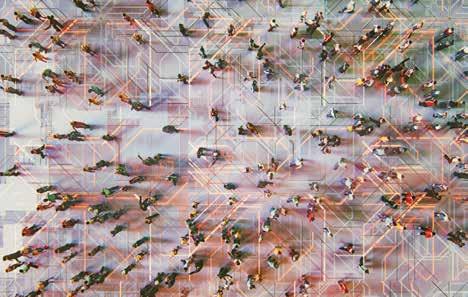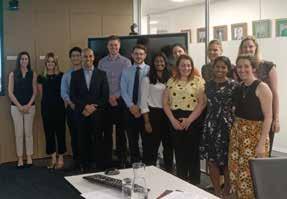
5 minute read
RANZCR Fellow the First Australian to Win the Anne. G. Osborn International Outreach Professorship
The Royal Australian and New Zealand College of Radiologists (RANZCR)
Inside News March 2020
The Anne G. Osborn Outreach Professorship which is offered by the American Society of Neuroradiology (ASNR) is a unique opportunity to learn and share knowledge across borders. It is a volunteer program available to senior members of the ASNR who are interested in teaching in developing countries. It is not a traditional visiting professor program but is an outreach program where the costs of the activities are shared between the ASNR member, the ASNR, and the host organisation in the receiving country. The main objective of the program is to facilitate the exchange of knowledge and techniques, and to teach. I was absolutely delighted to get an email notification from Dr Bruno Policeni, ASNR International Collaboration Committee Chair, informing me that I was selected to be the Anne G. Osborn ASNR Outreach Professor to Ethiopia for 2019.
It gave me an amazing opportunity to visit Ethiopia and was particularly exciting for me as this was the first time ASNR had chosen someone outside North America. I flew to Addis Ababa, Ethiopia in early April 2019 and spent about three weeks in the radiology department in the Black Lion (Tikur Anbessa) Specialized Hospital, School of Medicine, College of Health Sciences, Addis Ababa University. This is the main tertiary teaching hospital in the country with about 700 beds and has attached medical, nursing and pharmacy schools. The radiology department has a busy ultrasound service and has two CT scanners and one Philips MRI scanner. Unfortunately, the MRI scanner was not in service, therefore patients were sent to St. Pauls Hospital nearby for MRI studies. I spent most of my time at Tikur Anbessa Hospital, at the neurology faculty lecture theatre at Zewditu Memorial Hospital and a short visit to Wudassie Radiology Centre. Dr Tesfaye Kebede is the Chair of Radiology, Dr Abebe Mekonnen is Head of the Neuroradiology Division and Dr Tequam Debebe is the Dean of the Medical School. I had a warm welcome from the faculty on first day when I was introduced to other neuroradiology colleagues and had my hospital tour and orientation on the same day, finishing off with the best coffee.
The radiology department is fully subspecialised into different faculties with digital PACS in the reading room. Every day I was picked up by gracious hosts—hospital staff or attending clinicians—and dropped home safely to the hotel. The neuroradiology department is very well organised with attending faculty and has neuroradiology Fellows in training. The faculty and Fellows are very well trained with most of them educated in the US at Emory University. Dr Abebe Mekonnen was my host for the site and I can’t thank him enough for his hospitality and care, I never felt out of place and was regularly updated about lecture schedules and teaching plans.
Understanding the impact of CNS tuberculosis and discussing some phenomenal cases with Dr Mekonnen and his colleague Dr Saleh made me realise that I would never have seen cases such as these otherwise; it was a great learning experience for me, providing a wealth of knowledge. I really enjoyed the case discussions and was impressed by the variety of cases and disease spectrum in Ethiopia, very different to what I see at my practice here in Australia.
My day would start early in the morning with Tomoca coffee, the aforementioned best coffee in the world, on board for an 8 am lecture and second lecture at 1.30 pm after lunch. Both lecture sessions were well attended by neuroradiology and other radiology faculty and residents (registrars). I gave almost 16 lectures on various topics in neuroradiology and head and neck imaging with some case discussions and pertinent teaching points. I also attended neurosurgery case conferences and other clinical meetings. Every afternoon after lectures until six or seven o’clock in the evening was spent with residents teaching and reviewing live workstations cases. I saw almost every manifestation of CNS tuberculosis and some other unusual infections including HIV, schistosomiasis etc. I quickly learnt that paediatric neurology cases of brain stem and spinal cord lesions are not always gliomas and astrocytomas but also tuberculomas or schistosomiasis granulomas.
All the residents, Drs Aga and Frewoini, the faculty, and Fellows went out of their way to help me and make my stay comfortable. I would particularly like to thank chief resident Dr Aga for helping me out. They were my local guides who I got to know extremely well and heard some of their inspiring stories of hardships they had to go through to get into medical school and training programs.
I also had the honour of speaking at the National Neurosurgery Conference halfway through my visit. Different charitable organisations and local government are involved in tackling the problem of spinal dysraphism and this was a real eye opener. I gave three lectures at the conference and was hosted by Dr Abenezer Tirsit.
I had a great mix of teaching, learning, cultural and culinary experiences. There was one fine evening where folk dances from different provinces of Ethiopia took place and it was a holistic and cultural experience. I had opportunity to relish in some of the best Ethiopian food and delicacies, my favourite being injera, a local flatbread and shiro, a chickpea stew. Soon after came the farewell dinner at an Indian restaurant, it was difficult to say goodbye as I quickly realised that the visit was about to finish soon.
I am extremely grateful to the American Society of Neuroradiology (ASNR) for organising and facilitating the program, and to Prof Anne Osborn for supporting this incredible outreach professorship to promote neuroradiology throughout the world. Meeting this legend in neuroradiology at RSNA and at a few other conferences has really enriched me and getting a personal thank you note from Prof Osborn after finishing the professorship gave me an immense sense of fulfilment and I was really humbled by the gesture. This teaching experience has been one of a kind; I will cherish the memories for the rest of my life.
This trip gave me a flashback to the Rouse Travelling Fellowship I did through our College in New Zealand in 2012. I have made friends and colleagues for life in both. I hope to set up a more constant and robust online teaching platform for the residents as they really appreciate every moment of teaching. This experience was so special to me that it has influenced my life in a particularly positive way. There is a constant urge to go back for another visit which I will do in near future.
A/Prof Sandeep BhutaNeuroradiologist

Annual Neurological Surgery Conference at Ethiopian Public Health Institute











